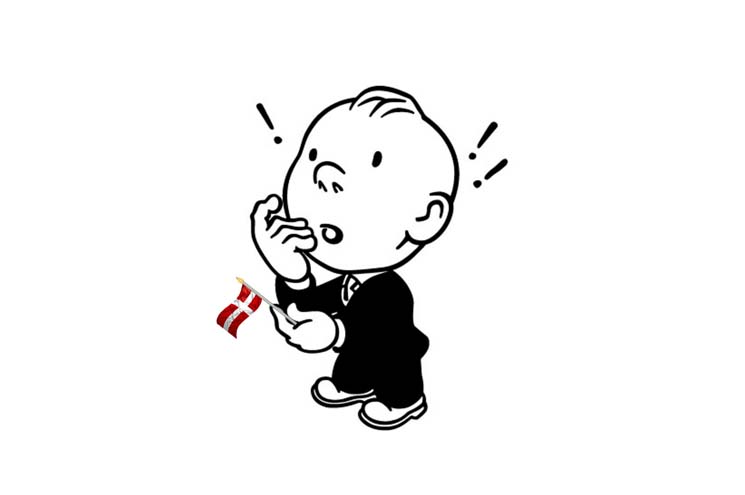Trust is so natural to the Danes and such an integral part of their culture that it is like the water fish swim through: even though it’s all around them, they barely notice it’s there.
As a foreigner, if your culture has a different outlook on honesty and trust, it’s important to adapt to the Danish way for as long as you’re in Denmark. If the Danes decide they can’t trust you, you might as well pack your suitcases and go home. Once you lose the trust of a Dane, it’s like losing your virginity: you’ll never get it back.
For example, your boss will trust you to make commitments and deliver on them. But maybe your culture prohibits telling a boss something she doesn’t want to hear. “Can it be done by Friday?” she asks. “Oh, sure,” you say, not wanting to lose face before the boss.
You know very well it cannot be done by Friday, and that when Friday comes you will have to come up with a plausible excuse.
Danish bosses don’t mind being contradicted. They would rather have you say directly, “Friday’s too ambitious. I can get it to you by next Wednesday if I clear my desk of other projects.”
On the other hand, if you promise to deliver on Friday and don’t, that will begin to erode your Danish boss’s trust in you.
Admitting mistakes
Part of the Danish Jantelov, which has its roots in the Lutheran Christian religious tradition, is admitting that you (like all other humans) are imperfect.
In a professional situation, this means that there is a general acceptance that you will make mistakes on the job. You will tally data incorrectly, you will make a programming error that makes the system crash, or you will forget to call the restaurant and make a booking for 25 pork dinners for your team’s Julefrokost.
The Danish way of dealing with mistakes is to admit it as quickly as possible and get on with the business of fixing things. Re-tally the data, fix the error, find another restaurant. Your boss or colleagues may express irritation with you, but they’ll put most of their effort into getting things running smoothly again.
A problem can arise, however, if you come from a culture in which mistakes are a humiliating loss of face and must be covered up or excused away.
If you hide a mistake in a Danish workplace, or even worse, lie about having made one, you can expect to find yourself quickly unemployed. Your Danish colleagues will forgive a mistake, but they won’t forgive a cover-up.
Corruption and payoffs
Denmark is regularly listed among the least corrupt countries in the world, which is one of it its charms. As slow or impassive as Danish bureaucrats can sometimes be, you can be confident that they are not expecting a payoff in order to get their jobs done.
In the workplace, that means it’s never OK to demand or receive a kickback for choosing a particular vendor or hiring an employee. If you do this, it will probably result in termination.
Some ethical questions aren’t as cut and dried. Are you allowed to keep the frequent-flyer miles you accumulate on business trips? Is it OK to use the company printer to print out flyers for your charity event? Will there be a problem if you catch up on the latest sports or celebrity news from your company laptop?
If you’re not sure, ask your supervisor or the company’s HR department. I generally ask the question via email so I have a written record of the response, and then print it out and keep it. (If you’re ever dismissed from a Danish company, you’ll immediately lose access to your email.)
If a client gives you a gift
Many Danish companies have policies against accepting gifts from clients. This is both for ethical reasons and because they see it as unfair to your desk-bound colleagues who don’t get to meet clients and don’t get any presents.
Ask your boss about this. Some companies require that all client gifts be turned in to a central source, such as HR, to be shared at the company Christmas party.
Gifts to your colleagues aren’t necessary
It’s not necessary to give your boss a gift, or to give gifts to any of your co-workers except on very special occasions, such as a new baby in the house.
In this case, some energetic person from the office will probably circulate and collect money from everyone to contribute to a team present.
If you know the person being celebrated, a contribution of DK50-100 is a nice gesture, but don’t be afraid to say ‘no’ if you sincerely can’t afford it. A card may be circulated for signatures as well. You generally don’t sign the card unless you’ve chipped in for the present.
Danish birthday behavior
When someone in the office has a birthday, they’re expected to bring their own cake or other delicacies to share with the team.
Your co-workers will often plant a Danish flag on the birthday worker’s desk; this isn’t a nationalist statement, just a general statement of birthday joy. They may also compliment the birthday worker on the day’s weather: good behavior over the previous year is thought to result in a sunny birthday.
You’re never required to give your co-worker a card or birthday present, although for “round” birthdays like 30, 40, 50, and 60, someone may take up a collection for a joint gift.
At Christmas time, the company sometimes gives a holiday gift to the employees. It’s usually a small luxury item. Either everyone gets the same thing or you are allowed to choose from two or three options of equal value. Generally, that value will be carefully chosen so you do not have to pay taxes on the gift you receive.
Buy Kay’s books about Denmark on Amazon, Saxo, Google Books, Apple Books, Barnes & Noble Nook, or via our webshop.
Image mashup copyright Kay Xander Mellish 2025





